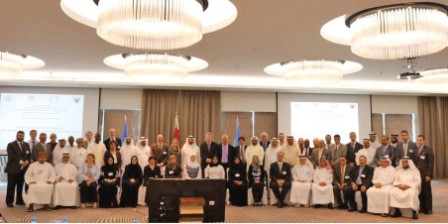Recycling centres to be set up for ODS
Bahrain will establish reclamation and recycling centres to process the Ozone Depleting Substances (ODS) at the end of 2015 or in the beginning of the next year, said Regional Network Coordinator United Nations Environment Programme (UNEP) Bahrain Dr. Abdulelah Alwadaee.
He was speaking on the sidelines of the workshops conducted at Grand Ramee Hotel here on Wednesday.
Speaking to the DT News, he said that they would ensure that all the formal and informal workshops providing services to the air conditioning and refrigeration plants in Bahrain get the recovery machines so that the emission of the ODS to the outside world could be stopped.
“Recovery machines are essential for the technicians working in refrigeration and air conditioning plants to gather the harmful gases to be recycled later at the reclamation centres,” said Alwadaee.
The ODS substances are very dangerous to the ozone layer on the earth’s stratosphere at an altitude of about 10 km. Ozone layer absorbs most of the ultraviolet radiation reaching the earth from the sun.
The UNEP in collaboration with the Supreme Council for the Environment in Bahrain organised a series of meetings (March 22 – 26) on the total phase out of ODS, which will conclude today.
Regional Network Coordinator, AF/E Ozone Action Compliance Assistance Programme, DTIE Regional Office for Africa, Patrick Odala Salifu said that ozone is a global issue. According to him, by 2030 the total phase out of ODS will happen.
Industrial Development Officer, Montreal Protocol Unit, UNIDO, Dalibor Kysela said that 179 countries had ratified the Montreal Protocol and Vianna Convention so far, which is unprecedented as far as other protocols are concerned. He said that countries had different policies to tackle this issue, some are doing specific legislation.
“The meeting’s objective is to ensure environment and ozone-friendly actions by the industries in West Asia region without damaging economic performance of the industries and social benefits they provide for the population at large,” said Kysela.
Policy and Enforcement Advisor, UNEP/ROWA Bahrain, Khaled Klaly said that all the countries should establish and enforce sound certification systems for refrigeration and air conditioning equipment. “This would result in reducing the emissions of ODS that are being used as refrigerants in the equipment.”
Programme Specialist Montral Protocol Unit, UNDP Regional Hub, Istanbul, Maksin Surkov said that the essence of the meeting was to share the experiences of different countries and spread knowledge about the ozone layer. He said that the chemical detrimental to the ozone layer was being produced in Chinese factories and distributed to the whole world.
Ozone officer Yemen Faisal Bin Ali Gaber said: “If we have to keep our planet safe, we would have to protect the ozone layer.”
During the five-day meetings, experts from 22 governments and other regional and international specialized organizations will discuss the actions
needed to be taken to overcome policy, technical and economic barriers, which may hinder the full compliance of developing countries with the targets established by the Montreal Protocol.
Related Posts

